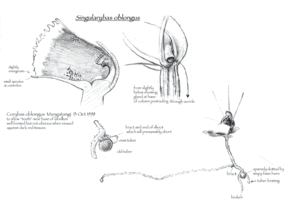You are here
Acianthinae_species
Corybas oblongus (Hook. f.) Rchb. f.
Nomenclature
-
Genus: CorybasSubgenus: Singularybas
-
Synonyms: 3
SUMMARY
Plant: variable in size, 2.5-5 cm high
Leaf: sessile, solitary or very rarely 2, 2 –3 cm by 4-5 cm long, ovate-oblong, apiculate, rounded or cordate at the base, thin and membranous, conspicuously veined when dry, brown-veined when fresh, glaucous above, reddish below.
Peduncle: c. 4 mm [?]
Bract: rather large, sometimes foliaceous, erect, acuminate, secondary bract .
Ovary: c. 5 mm long, cylindrical
Flower: small, shortly peduncled, solitary or very rarely two together, about 6 mm long, reddish-purple, white edged labellum, greenish dorsal sepal, laterals pale at base, purple above, peduncle and ovary reddish
Dorsal sepal: narrow, concave, oblong when spread out, obtuse or apiculate, arched over the lip
Lateral sepals: filiform-caudate, erect, about twice the length of labellum, 6-20 mm long
Lateral petals: similar, smaller, usually suberect
Labellum: 5 mm, involute, the margins meeting behind the column and enclosing it, broadly semicordate when spread out; apex truncate, coarsely toothed or fimbriate, center of disc with minute dentiform papillae (cluster of dark calli inside base of labellum); deep blood-red purple, with pale, transparent edges
Auricles: rounded
Column: short, stout, curved to the front, with a conspicuous swelling at the base.
Capsule: on peduncle elongating up to 16 cm
Distribution: North and South Islands, Stewart Island, Auckland islands
Ecology: Not uncommon on moist shaded banks. Small groups or scattered. Predominently self-pollinating.
Elevation: Sea-level to 1200 m




